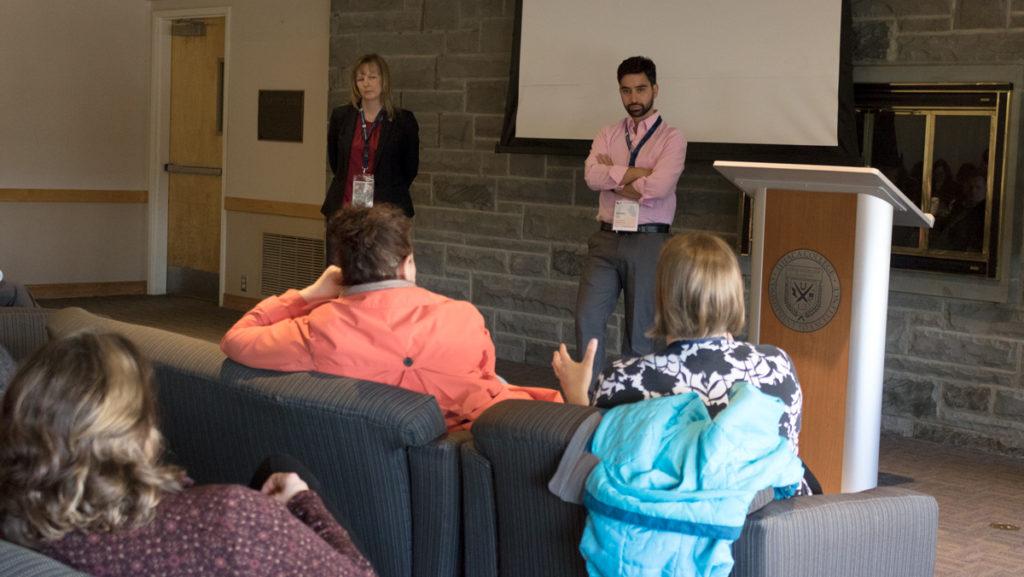Representatives from the Middle States review team suggested Ithaca College reassess the purpose of the Integrative Core Curriculum program during their visit Feb. 26–28, following responses from faculty, staff and students.
The review team visited the college to determine if the college’s accreditation will be renewed. Accreditation ensures that students can receive federal funding and that degrees from the college are recognized as legitimate. The last visit by the review team was in 2008, as colleges are eligible for reaccreditation every 10 years.
Joseph Bascuas, visiting professor at Florida Gulf Coast University and part of the Middle State review team, offered non-binding suggestions and recommendations for how the college could improve in moving forward Feb. 28 to a room of approximately 80 staff and faculty members. Bascuas said the college passed all seven standards that Middle States requires to get reaccredited, and the final decision of reaccreditation will be made by the end of June.
The seven standards are: mission and goals; ethics and integrity; design and delivery of student learning experience; support of the student experience; educational effectiveness and assessment; planning resources and institutional improvement; and governance, leadership and administration. Bascuas said he recommends that the college assess how well the ICC is working and make the process to change it as transparent as possible.
“We concur with broad, campus sentiment that the ICC should undergo a highly visible program review as one of the very first major responsibilities of the new provost,” Bascuas said. “All relevant entities will need to participate in the process, and substantial student participation is strongly encouraged.”
Bascuas said the way student success is measured in the ICC, with the e-portfolio, should be addressed by the college.
“Of the questions that should be addressed are the relationship between major and ICC requirements, and how each affects the other,” Bascuas said. “The college should evaluate the validity of the artifacts uploaded to the e-portfolio and the extent to which they provide a meaningful standard.”
Bascuas said certain areas of general education that the ICC was meant to address are not being met.
“Data from ICC indicates that the learning outcomes in social sciences, natural sciences and diversity are not being met,” Bascuas said. “The ICC should give priority to continuing assessment of these learning outcomes and should use their collective data when considering structural changes to the program.”
At the student feedback sessions Feb. 26 and 27, representatives from the review team, Bascuas and John Noakes, associate professor of sociology and chair of the Department of Sociology, Anthropology and Criminal Justice at Arcadia University, asked the 32 students present questions about what they think of the college. The sessions were open to all students. Students mentioned the high cost of tuition and the shortcomings of the ICC. Students also complained about the college spending too much money on marketing instead of faculty and students.
After a student talked about the difficulty of being able to pay for tuition, Noakes asked the students present about the effect of the high tuition on students.
“So I bet it’s fair to say that money is a deal breaker for most people,” Noakes said. “In your experience, have you seen some of your classmates leave because of finances?”
Approximately half the students raised their hands.
Despite a number of negative comments, Noakes and Bascuas asked students to provide positive feedback as well. Near the end of the session, Noakes asked the students if they liked anything about the college. Several students responded with praise.
Senior Kelly Reid said the School of Health Sciences and Human Performance helps prepare students for future jobs.
“I’m going to be going to grad school soon and I feel so ready,” Reid said. “And I think all the professional programs are really great within HSHP.”
The session for staff members was held Feb. 27 and was facilitated by Mario Herane, vice president for development at Universidad Mayor in Chile, and Kathryn Morris, provost and vice president for academic affairs at Butler University. Approximately 60 staff members showed up to answer Herane and Morris’ questions about staff members’ opinions of the college.
Compared to the student session, staff members provided less negative feedback. Most of the comments they received were either neutral or positive in their portrayal of the college.
Morris asked the group of staff members who did not interact with students on a daily basis if they felt their job still related to the college’s mission of servicing students.
Maura Donovan, associate director for regional programs in the Department of Alumni Relations, said her work with alumni is important for students after they graduate.
“So even though I don’t work directly with the students, the work that I do, in the end, is to benefit the students,” Donovan said. “Those students, I’ll eventually work with as alumns, so you want to have the best experience they can have on campus which they can then carry on with them.”
Luke Keller, Dana professor in the Department of Physics and Astronomy, is the co-chair for Middle States accreditation self-study report for the college. Keller said a new strategic plan will be required moving forward, and that schools within the college are coming up with their priorities for a new strategic plan.
“We’re already working on it at the school level,” Keller said. “The provost has asked each of the schools to come up with priorities. You know, ‘what do you want to do as a school in the next strategic planning process,’ and we’re having meetings to talk about that.”








